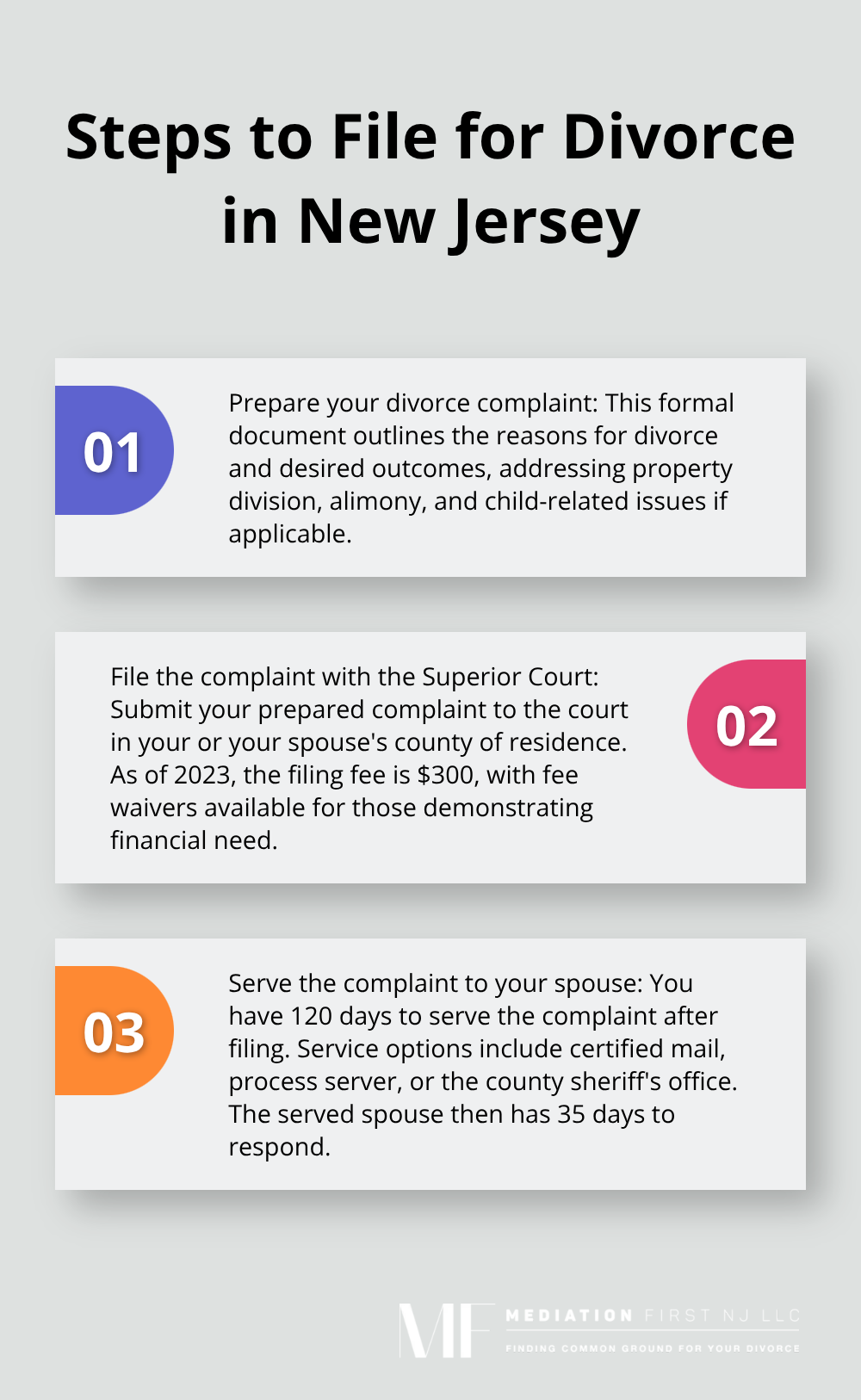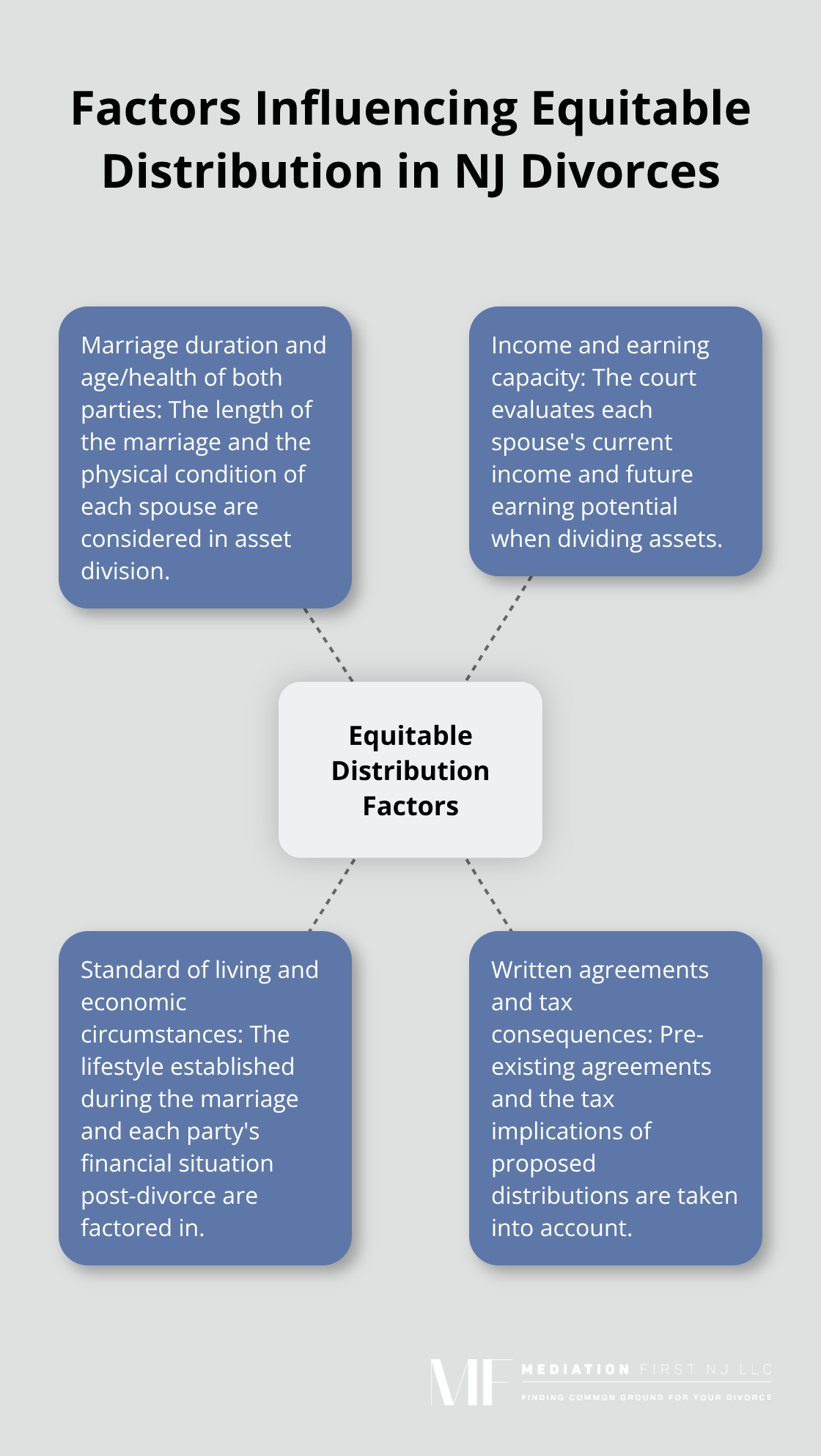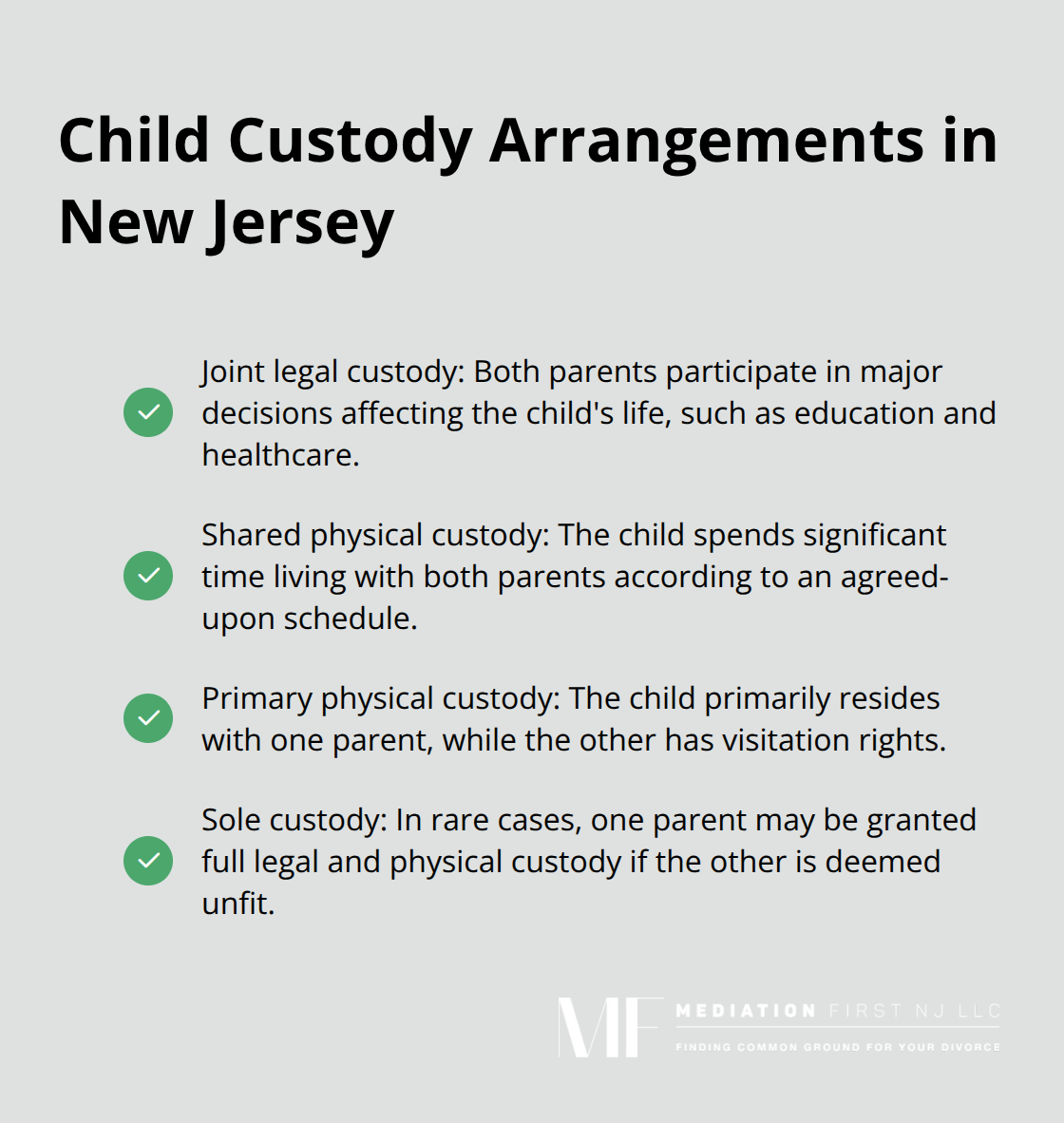Navigating the NJ divorce process can be complex and emotionally challenging. At Mediation First NJ LLC, we understand the intricacies involved in ending a marriage in New Jersey.
This comprehensive guide will walk you through each step of the divorce journey, from filing to property division and child-related issues. We’ll also explore how mediation can simplify and streamline the process for both parties.
How to File for Divorce in New Jersey
The divorce filing process in New Jersey involves several critical steps. This chapter outlines the key aspects of initiating a divorce in the Garden State.
Grounds for Divorce
New Jersey allows both no-fault and fault-based grounds for divorce. Unlike fault-based divorce, a person must only establish that they have either separated from their spouse or that they have irreconcilable differences.
Fault-based grounds encompass:
- Adultery
- Desertion
- Extreme cruelty
- Substance abuse
Preparing Your Divorce Complaint
The divorce complaint is a formal document that outlines the reasons for divorce and desired outcomes. It should address:
- Property division
- Alimony (if applicable)
- Child custody and support (for couples with children)
Accuracy and thoroughness in this document are paramount, as it sets the foundation for the entire divorce proceeding.
Filing and Serving the Complaint
Once prepared, you must file the complaint with the Superior Court in your or your spouse’s county of residence. As of 2023, the filing fee stands at $300 (fee waivers are available for those who demonstrate financial need).
After filing, you have 120 days to serve the complaint to your spouse. Service options include:
- Certified mail
- Process server
- County sheriff’s office

Response Options for the Served Spouse
The served spouse has 35 days to respond to the complaint. They may choose to:
- File an answer agreeing with the terms
- Submit a counterclaim disputing aspects of the complaint
- Not respond (which may result in a default judgment favoring the filing spouse)
The initial filing process often sets the tone for the entire divorce. A well-prepared complaint and thoughtful approach to serving can pave the way for a more amicable process. Many couples find that considering mediation early on can help reduce conflict and streamline negotiations from the outset. Mediation is usually faster than going to court and can save you money.
While these steps provide a basic overview, it’s important to note that each divorce case is unique. Factors such as complex assets (e.g., businesses or multiple properties), child custody disputes, or disagreements over alimony can add layers of complexity to the proceedings. Professional guidance can prove invaluable in navigating these intricacies effectively.
As we move forward, we’ll explore the next crucial phase of the divorce process: property division and financial considerations. This stage often requires careful analysis and negotiation to ensure a fair distribution of assets and debts.
How Property Is Divided in a New Jersey Divorce
Equitable Distribution Model
New Jersey follows an equitable distribution model for property division in divorce cases. This approach does not guarantee a 50/50 split but strives for a fair division based on various factors. Courts consider the unique circumstances of each case to determine an equitable distribution of assets and debts.
Identification of Marital Assets and Debts
The first step in property division involves creating a comprehensive list of all assets and debts acquired during the marriage. This includes:
- Real estate
- Vehicles
- Bank accounts
- Retirement accounts
- Investments
- Business interests
- Credit card debts
- Mortgages
- Personal loans
Transparency is paramount in this process. Concealing assets can result in severe legal consequences.
Asset Valuation
Accurate valuation forms the foundation of fair distribution. Complex assets (such as businesses or real estate) often require professional appraisers.
Factors Influencing Distribution
New Jersey courts weigh numerous factors when determining equitable distribution:
- Marriage duration
- Age and health of both parties
- Income and earning capacity of each spouse
- Standard of living established during the marriage
- Written agreements made before or during the marriage
- Economic circumstances of each party after the division
- Tax consequences of the proposed distribution

Alimony and Spousal Support Considerations
Alimony is not automatic in New Jersey divorces. Courts consider factors similar to those used in property division when determining alimony. The 2014 New Jersey Alimony Reform Act introduced significant changes, including generally limiting alimony amounts to no more than 30 to 35 percent of the difference between the parties’ gross incomes.
Property division often intertwines with child-related issues in divorce cases. The next chapter will explore how New Jersey courts address child custody, parenting time, and support obligations to ensure the best interests of children are prioritized throughout the divorce process.
Protecting Children During Divorce
Child Custody Determination
New Jersey courts prioritize the best interests of the child in all custody decisions. Child custody arrangements typically fall into two categories: legal custody and physical custody. Legal custody grants the right to make important decisions about the child’s upbringing, including education, healthcare, and religious practices. Physical custody determines where the child primarily resides.

Courts often favor joint legal custody, allowing both parents to participate in major decisions affecting their child’s life. Physical custody arrangements vary based on family circumstances and may include:
- Shared physical custody
- Primary physical custody with one parent (with visitation rights for the other)
- Sole custody (in cases where one parent is deemed unfit)
When determining custody, courts consider factors such as each parent’s ability to provide a stable home environment, the child’s relationship with each parent, and any history of domestic violence or substance abuse.
Parenting Time Establishment
Parenting time (also known as visitation) outlines when each parent spends time with the child. New Jersey courts encourage parents to create a schedule that works for their family’s unique situation. If parents cannot agree, the court will impose a schedule based on the child’s best interests.
Parenting time schedules can be highly flexible, ranging from alternating weeks to more complex arrangements that account for work schedules, school activities, and holidays. The primary goal is to maintain strong relationships between the child and both parents while providing stability and consistency.
Child Support Calculation
New Jersey uses specific guidelines to calculate child support based on both parents’ incomes, the number of children, and the custody arrangement. The Child Support Guidelines Calculator is for informational purposes only and is not a guarantee of the amount of child support that will be ordered.
Child support calculations can be complex, especially in cases involving high-income parents or children with special needs. In these situations, the court may deviate from the standard guidelines to ensure the child’s needs are adequately met.
Custody and Support Order Modifications
Life circumstances change, and custody and support orders may need modification over time. New Jersey allows for modifications when there is a significant change in circumstances, such as:
- A substantial increase or decrease in either parent’s income
- Changes in the child’s needs or expenses
- Relocation of one parent
- Significant changes in the parenting time schedule
To modify an existing order, the parent seeking the change must file a motion with the court and demonstrate how the current circumstances differ from when the original order was established.
Professional guidance often benefits parents navigating child-related issues during divorce. Mediation First NJ LLC assists parents in negotiating modifications outside of court, which can save time and reduce conflict. By focusing on the child’s best interests and maintaining open communication, parents can create a stable and supportive environment for their children despite the challenges of divorce.
Final Thoughts
The NJ divorce process can challenge couples emotionally and financially. Mediation offers a powerful alternative to traditional litigation, allowing couples to maintain control over outcomes and reduce costs. Mediation First NJ LLC specializes in guiding couples through divorce with compassion and expertise.
Professional mediators create a neutral environment where both parties express their needs and concerns. They help navigate complex issues such as property division, child custody, and support arrangements. Mediation often results in agreements that both parties find satisfactory, leading to faster resolutions and better long-term outcomes.
Couples who consider divorce in New Jersey should educate themselves about their options. Consulting with a qualified mediator can help understand how alternative dispute resolution methods benefit specific situations. The NJ divorce process doesn’t have to become a win-lose scenario; with the right support, couples can reach resolutions that allow both parties to move forward positively.

